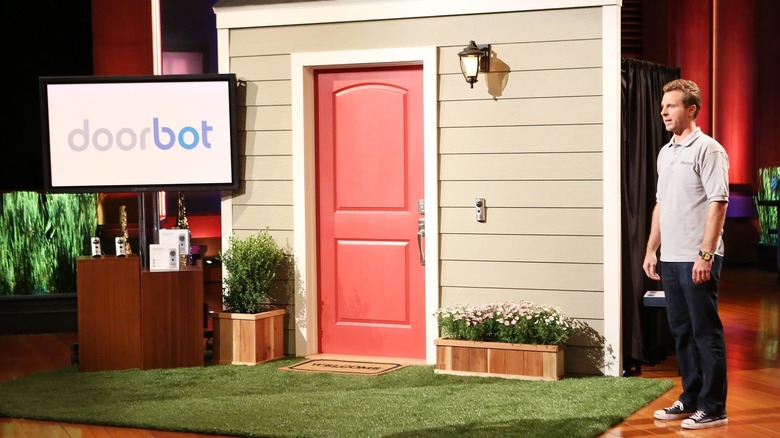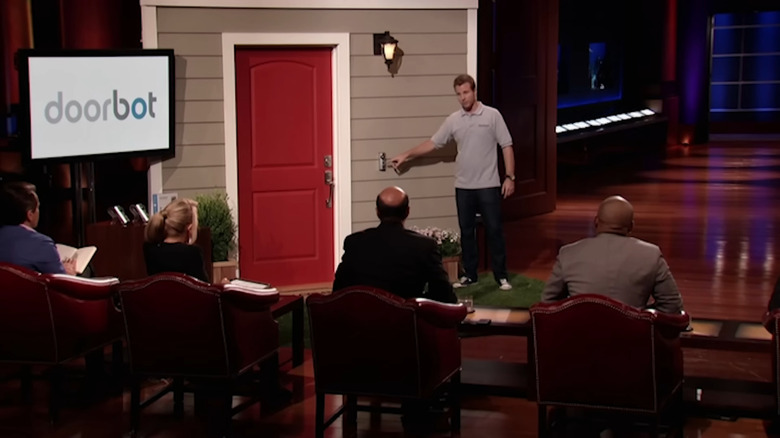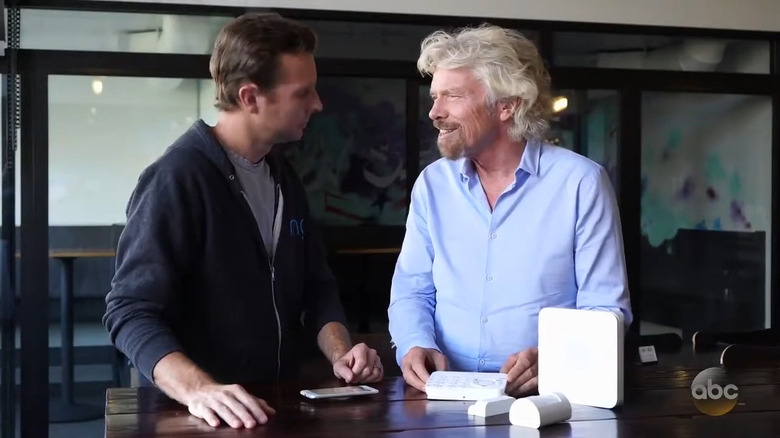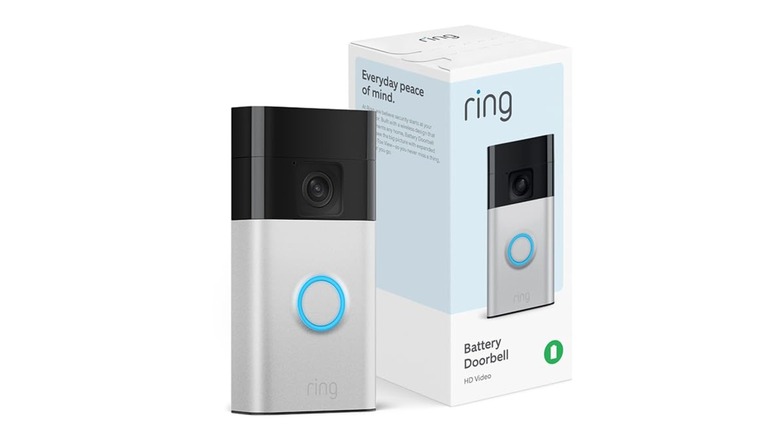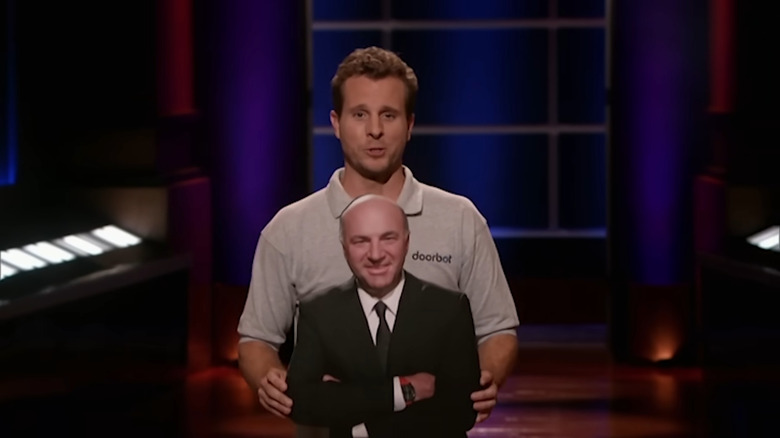What Happened To DoorBot From Shark Tank Season 5?
We may receive a commission on purchases made from links.
The ninth episode of the fifth season of "Shark Tank" premiered on ABC on November 15, 2013 in front of an audience of 6.48 million people according to Nielsen Media Research's viewership ratings. The first of four pitches fielded by the Sharks that week was for DoorBot, an internet-connected video doorbell system of the variety that has since become much more common. The Sharks were impressed by the product itself and the impressive sales that DoorBot had accrued in a short period of time. However, they had reservations about the scalability of the company, brand alternatives on the market, and the relative security of the devices and platform themselves. As a result, Simonoff left without a deal, but fear not: He'd soon find a significant outside investor in sometimes private astronaut Richard Branson, who was wowed by a friend's DoorBot system in the wild.
Eventually, DoorBot rebranded as Ring, which was eventually acquired by Amazon for over $1 billion, being absorbed into its smart home ecosystem in the process. Now, as Ring, it's a premiere brand in cloud-based home security systems that continues to thrive to this day. As for Siminoff himself, he took a few years away from Ring to work on a more landlord-focused smart door lock company, before eventually returning to Amazon in 2025 to help run the part of the company that includes Ring and similar divisions that deal with smart home products. Let's take a deeper dive at how this played out.
What happened to DoorBot on Shark Tank?
Jamie Siminoff entered the tank seeking a $700,000 investment for a 10% equity stake in DoorBot, his smart home technology company focused on internet-connected video doorbells with smartphone integration. He made sure to note that DoorBot wasn't simply a convenient gadget, but also had security features, like how it lets you communicate with a visitor as if you're home even if you're not.
Asked by Lori Greiner about potential robbers messing with DoorBot, Siminoff explained that robbers actually ring doorbells often to try to find empty houses, as well as that DoorBot replaces stolen units for free. Prompted by Daymond John and Kevin O'Leary, he explained that DoorBot sells for a $199.99 MSRP, with the landed cost to make it being $81.83. In the product's first nine months on the market, DoorBot grossed $1 million, with the last month yielding $250,000 in sales, showing strong month-to-month growth.
Greiner opted out first, saying she didn't think DoorBot was clearly differentiated enough from rival products to warrant the $200 price tag. Mark Cuban followed, not seeing it as a company that could scale, as did Daymond John out of concern that existing home security players could steamroll them. Robert Herjavec dropped out over concerns that it could be more hackable than a hardwired security system. This left O'Leary, who couldn't agree with Siminoff on if a royalty deal or a venture debt deal was most appropriate, so Siminoff left without a deal.
What happaned to DoorBot after Shark Tank?
Most of the time when you click on a "Shark Tank" update article, you're probably going in relatively blind as to what happened to the company in question. In this case, however, there's a pretty decent chance that, before you opened up this one, you knew the broad strokes of what came next for Jamie Siminoff's company after his segment aired: Richard Branson decided to invest after discovering DoorBot in the wild when he saw that a friend had the doorbell system, the company rebranded as Ring, and it was eventually sold to Amazon in 2018 for over $1 billion.
Several months after selling Ring to Amazon, Siminoff had the unique distinction of returning to "Shark Tank" in the season 10 premiere as a guest Shark. "What's great about Amazon is they're still gonna let Ring run as an independent company," he said in the "Shark Tank Update" that opened the episode in question. "That lets me focus on what I love: Building product and making neighborhoods safer. 'Shark Tank' has been key to me achieving my American dream, and I think it's been such a great show for families to watch. Kids are growing up seeing what entrepreneurs can do, what inventors can do, and how you can build your own destiny. It's amazing to think that five years ago, I was a broke inventor running this business in my garage, and today I have the means and freedom beyond my imagination."
Is Ring still in business?
Ring is very much still in business, with a wide range of products available that extend the feature set of its video doorbells and other home security products. Want solar-powered cameras? Ring's got those, as well as USB Type-C connectable solar panels to use with whichever Ring products don't already have solar panels built in. If you're looking for lights that can easily be integrated into your home security system and triggered by your Ring devices, then they've got you covered on that, too. Ring has also built an ecosystem that has room for third-party products that are compatible with Ring security products, including smart water shutoff valves, smoke and carbon monoxide detectors, smart thermostats, smart plugs, smart dimmers, garage door controls, door locks, and various Amazon Alexa devices.
Ring's products continue to be well-reviewed. The $49.99 Ring Video Doorbell Wired, for example, is the current budget pick recommended by The Wirecutter, the New York Times' review and recommendation website known for its thorough "shootout" testing. That review praises the doorbell's low price, consistent performance, and simple installation process, albeit while noting that it doesn't have as robust a feature set as that of the Google Nest doorbell that is listed as the site's top pick overall. Meanwhile, in April 2025, a PCWorld review of the Ring Outdoor Cam Plus indicated that, at least for that product, Ring's improvements in new models may be on the incremental side, as opposed to a major generational leap forward.
What's next for Ring and its founder?
In May 2023, Ring announced that Jamie Siminoff was leaving the company to pursue other ventures independently. The next day, he was announced as the new CEO of Latch, another smart home company, which rebranded as Door.com under his leadership a few months later. Door.com became associated with landlords using its products to manage access to their properties, but Siminoff wouldn't stick around long to lead that direction. In November 2024, he announced a switch to an advisory role effective New Year's Day 20. "I joined Latch to help build a foundation for growth, and I believe we have done just that," Siminoff said in a statement. "I look forward to continuing to support the team as Doorman."
You may be able to guess what happened next: Siminoff returned to Amazon as a vice president in April 2025, where he now leads the Ring, Blink, Amazon Key, and Sidewalk teams. In that role, he works alongside Panos Panay, Amazon's SVP of devices and services. "So Panos and I have talked about this a lot—about the experiences we can create with devices that are awesome on their own, but even better together," he said in an Amazon corporate website Q&A when asked what role he envisions for Amazon devices in the smart home ecosystem. "I think you'll continue to see a lot of that from us moving forward—helping customers stay safe, connected, and informed as part of a magical connected experience."
